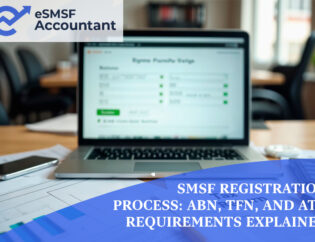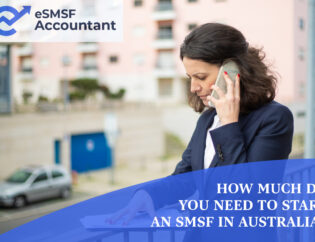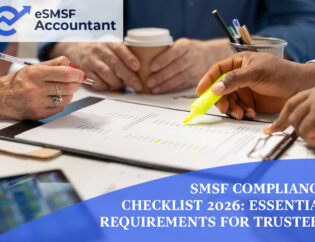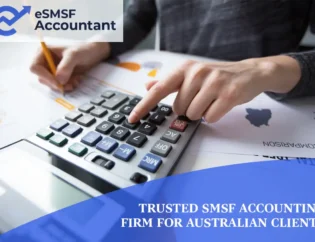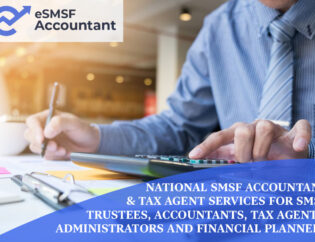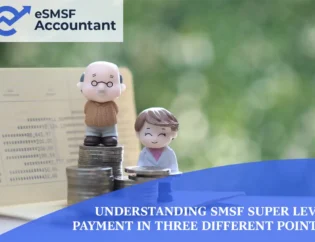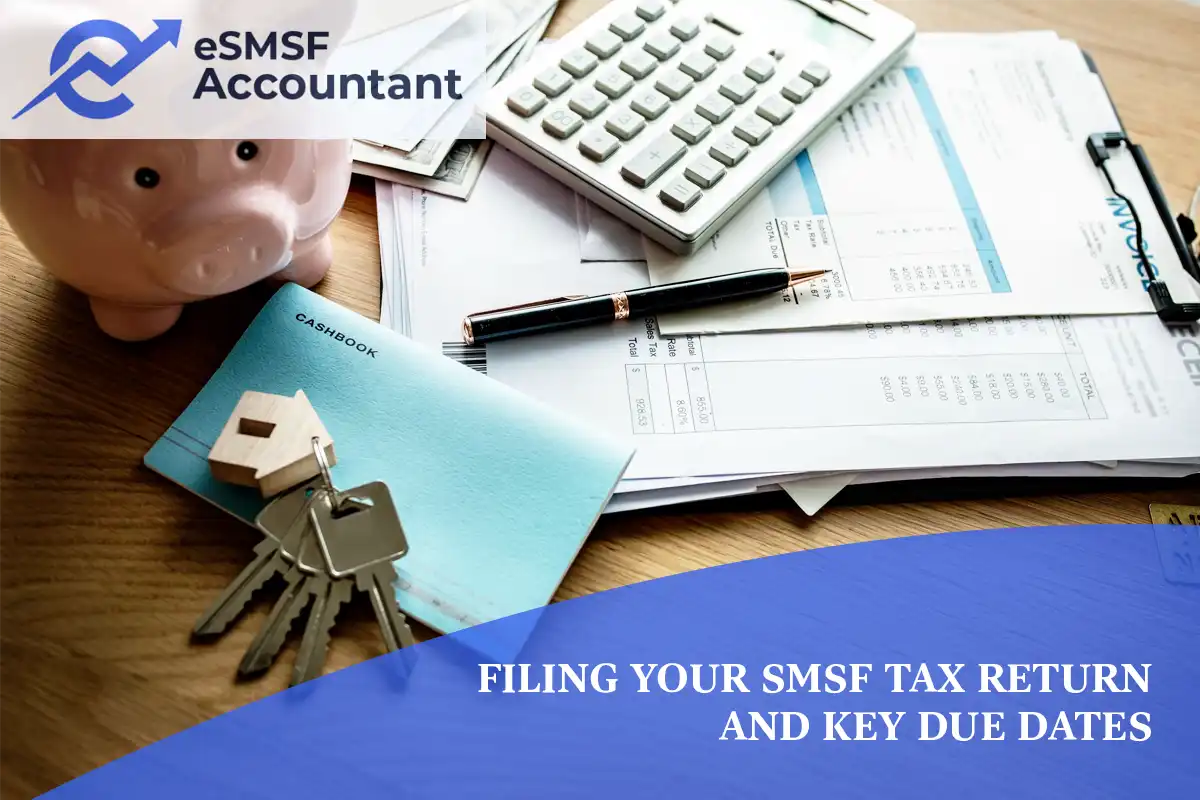
Lodging your SMSF Annual Return (SAR) is more than just ticking a box – it’s a vital responsibility. Missing deadlines can result in ATO penalties, impact your fund’s compliance, and even lock you out from making contributions. This guide walks you through what the SAR includes, the deadlines based on different scenarios, and how to meet all your
commitments throughout the year. No investment advice – just clear technical information for trustees.
What Is the SMSF Annual Return (SAR)?
The SAR is a single form that combines superannuation reporting with tax data. It covers:
- The fund’s income, expenses, gains, and losses.
- Member contributions and tax components.
- Pension payments and any exemptions claimed.
- Compliance confirmations, including auditor details and levy payments
Submitting the SAR assures the ATO that your fund meets the Superannuation Industry (Supervision) Act’s requirements and remains compliant. You can only submit once your annual audit is finished – making timing essential.
Important Due Dates for Your SAR | Filing SMSF Tax Return
Deadlines depend on how you filing smsf tax return and your fund’s past lodgements:
- 31 October – For trustees lodging themselves, especially newer SMSFs or those with past deficits.
- 15 May – Standard date for existing SMSFs lodged by registered tax agents.
- 28 February – An early deadline for certain initial agent-lodged returns newly registered SMSFs.
A completed audit must precede the SAR lodgement so your financials are accurate and certified.
What Happens If You Lodge Late?
Delaying your return can lead to serious consequences:
- You may face Failure-to-Lodge penalties that increase every 28 days.
- Your fund might lose the ability to receive contributions or rollover amounts.
- The ATO may declare it non-compliant, which means it could be taxed at a higher rate.
- Ongoing delays risk removal from tax agent lodgement programs and loss of deadline extensions.
Staying punctual safeguards both your fund’s status and flexibility.
Other Deadlines Throughout the Year | Filing SMSF Tax Return
Staying compliant doesn’t stop with the SAR:
TBAR (Transfer Balance Account Report)
- Due within 28 days after the end of the quarter in which the event occurred.
30 June pension payments
Minimum payments must be made to maintain tax-advantaged pension status.
PAYG and BAS deadlines
Required quarterly.
How Specialist Filing SMSF Tax Return Services Help
Using a dedicated SMSF tax service ensures you stay compliant with ease:
- They track your SAR deadline accurately, based on your situation.
- They align your audit and return so everything is filed correctly.
- They reconcile pension payments and contributions before you lodge.
- They manage TBAR reporting if needed.
- They submit your return and calculated tax promptly.
- They monitor your fund status online to avoid any loss of privileges.
With this help, you avoid late notices, penalties, and unnecessary stress.
The Role of Your SMSF Auditor Before Lodging
Before your SMSF Annual Return can be lodged, your fund must be audited by an approved SMSF auditor. This is not optional – its a legal requirement.
The audit has two parts:
- Financial audit: Ensures your SMSFs financial statements are accurate and complete.
- Compliance audit: Checks if your fund has followed all rules under the Superannuation Industry (Supervision) Act.
Why is this important?
If your auditor finds compliance breaches, they are obligated to report them to the ATO.
The audit report must be obtained when filing SMSF tax Return, so delays in auditing lead to delays in filing.
Tip: Book your auditor early – especially between July and October – since demand is high and delays can affect your SAR deadline.
Tips for Staying Lodgement-Ready All Year
Filing your SMSF tax return shouldn’t be a last-minute scramble. Here are a few habits to stay prepared all year long:
- Automate recordkeeping: Use SMSF accounting software to record every transaction in real time.
- Set quarterly calendar alerts: Keep due dates for TBAR, SAR, and BAS (if applicable) visible.
- Reconcile bank accounts monthly: Avoid year-end surprises by checking for missing or unmatched transactions.
- Maintain communication: Stay in touch with your accountant and tax agent, especially if there are big fund changes like asset sales or pension starts.
Doing a little every month makes compliance easier and less stressful at the end of the year.
Why This Is a Complete Guide to Filing SMSF Tax Return
If you’ve made it this far, you now understand more than just the deadlines. You know what goes into a proper SMSF tax return, what documents are required, how audits tie in, and how penalties can add up if things aren’t done correctly.
So why call this a complete guide?
Because it walks you through:
- The key dates that every trustee needs to know.
- The role of SMSF auditors before filing.
- What goes into the SMSF Annual Return (SAR).
- How to avoid common lodgement mistakes.
- Best practices for staying organised year-round.
When managing your own super fund, the difference between stress and confidence comes down to process. A solid checklist. Clean records. A capable SMSF accountant who’s handled hundreds of returns just like yours.
This complete guide isn’t just about ticking boxes. It’s about helping you take control, stay compliant, and sleep easier knowing your fund is being managed right.
Common Questions Answered
Q: What if I file myself and miss 31 October?
A: You risk penalties and losing contribution access. For those behind, working with a tax agent ASAP is strongly recommended.
Q: Do agents get an extension?
A: Yes – regular filings via a tax agent lodgement due date is 15 May for existing SMSFs, and 28th Feb if its new SMSF with first year return (with previous returns lodged on time).
Q: When does the audit happen?
A: Before SAR lodgement – typically a few weeks earlier – so everything is signed off and complete.
Q: What if my fund had no activity this (first) year?
A: You can lodge a “Return not necessary” or opt to cancel registration. Regular deadlines resume once you file again.
Q: What is TBAR, and when is it required?
A: Its transfer balance account reporting and reports events to the tax office for members pension account. It is within 28 days after the end of the quarter of the event occurrence.
Final Thoughts
- Keep your SAR, audit, and other reporting deadlines clearly marked in your calendar.
- Ensure audits are completed before attempting SAR lodgement.
- Use a specialist SMSF tax service to avoid accidental errors or missed deadlines.
- Track key reports like TBAR, pension payments, BAS, and PAYG – all part of ongoing compliance.
Feel free to reach out if you like to know more about SAR, deeper explanations, or support in any part of this process.


